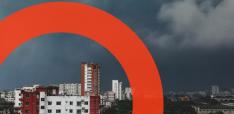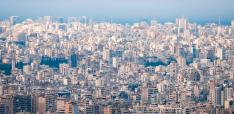Extreme Fieldwork: North Korea
Now, I’m in the position of supervising a student’s fieldwork abroad, and it’s a fascinating experience. I have been waiting to blog until my student safely returned from fieldwork, for reasons you’ll appreciate upon reading this, but now that he is safely home, I feel I can write a bit on this topic.
My student, who I’ll refer to as Sam (which is not his real name) for security and immigration reasons, is a remarkable person, so let’s start there. He took a course that I teach in economics at Northwestern and enjoyed it very much (which is always flattering!). We had certain things in common. He’s ex-military and hence had some travel experiences similar to mine. He was interested in developing countries, since his family (like mine) had experienced the benefits of development during the Twentieth Century. He also was interested in gathering information in the field and in empirical economics and in the intersection between anthropological and ethnographic work and economic observations. I stayed after class once or twice to chat with him about his interests and assured him that I’d keep his CV “in the hopper” if I was looking for researchers or research assistants, as I often do with top students.
I thought nothing of it and, honestly, didn’t expect to hear from him until, perhaps, a thank-you note at graduation or something of that nature.
Only two terms later, however, I received an email from the Dean asking whether I would consider supervising independent study for Sam. Now, independent study permission is rarely granted in economics and even more rarely for undergraduates, so I knew something was up. I scheduled a Skype call with Sam and learned that he had been to North Korea before and had now secured an opportunity to travel to North Korea for an extended period. We met before the evening section of the masters-level microeconomics class I was teaching that term and I cautiously asked what he hoped to learn in North Korea.
Now, for context, I had often referred to North Korea in the class he’d taken. It has long fascinated me, not least because of its unusual internal dynamics, strange border agreements with China, proxy currencies, black market manufacturing activities, and shocking consumption of champagne and cognac for a country where 99% of the country couldn’t afford a can of cheap beer.
I agreed to supervise, and agreed to not say anything about it to anyone until he had safely returned.
I had discussed with him what could be observed to make economic conclusions about the economy and it felt like a Cold War spy drama. I told him that when he saw a truck, he should pay attention to where the truck was made, what tires it had, where the tires were made, how worn the tires were, whether there was visible rust or recent repairs, etc. I told him that whenever he was in a room alone, he should unscrew a lightbulb and see where it was made. And so on. The list went on and on until my masters students began to arrive for their lecture. And then, a few weeks later, Sam left for North Korea.
I will not discuss his logistics here for obvious reasons. I will say, however, that for an extended period, Sam was in North Korea, at times alone. He carried multiple memory cards at all times, taking photos and quickly swapping them in and out of his camera so that when cards were seized by suspicious officials they were not holding more than a few photos. He maintained this level of diligence for the entire trip, hiding many of the photos even until after his return.
What he learned, which will turn into a forthcoming article, is absolutely fascinating. The level of partition in North Korean society not only leads to a bipolar distribution of wealth, but living standards that are almost binary in their character. Parts are heavily-secured and well-maintained, while the rest of the country rots, with feeble trucks attempting to make it to their next destination on heavily-used, spalling Chinese military surplus tires from twenty years ago. The remains of a once-hopeful rural subsistence fantasy have finally collapsed; only 20% of the country is arable land and much of this floods too dramatically for even the most robust rice to survive and bloom. The attempted mechanisation of parts of the economy has failed completely, with lawns in the capital being cut by hand, sometimes with tweezers to create maximum employment.
North Korea has lost any of the know-how to create its own factories, leading it to depend heavily on old imported stock, much like Cuba. As a result, the tiny supply (only one thousand vehicles) of Volvos that were imported from Sweden (these were model 144’s) are still around. Among his most fascinating observations were the minimum wage calculations, which I won’t explain in detail here. But his summary of them is, I think, excellent: “The [DPRK government] provides everything the people need to live (food, housing, haircuts, simple household items, etc.) and pays DPRK citizens a salary so low that it's like a kid's allowance.” To illustrate the desperate state of the economy’s agricultural sector, eggs and milk were both in serious states of shortage during Sam’s visit.
I look forward to working with Sam and developing this research further, and I feel grateful for an opportunity to supervise an outstanding and brave student willing to undertake this type of potentially-dangerous research. This experience, and my own experience in Uganda during my M.Phil./Ph.D. fieldwork, have reinforced my view that time in the field is essential for empirical work and that simply downloading a dataset – no matter how rich – will never duplicate the experience of visiting a place and making observations.
This is yet another reason recent events should be considered very seriously, most notably the BBC’s scandalous behaviour which included a reporter posing as an LSE professor, as any abuse of the system weakens fieldwork as a tradition in the social sciences and threatens fieldwork as a valuable and important opportunity for future students. If you are a student reading this (and I know many are) who has not spent time in the region that interests you, I suggest you find a way to do so… before it is, by no fault of your own, too late.

